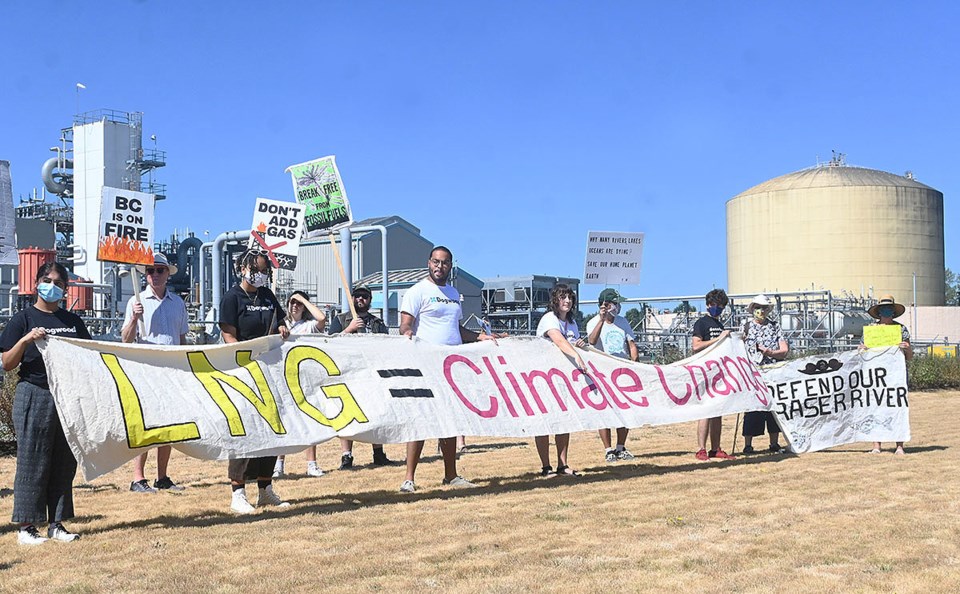The City of Delta continues to take a neutral stand on FortisBC’s proposed LNG expansion and the marine Jetty project at Tilbury.
Climate activists on Monday rallied outside Minister of Environment and Climate Change George Heyman’s constituency office calling on the minister to reject the Tilbury Marine Jetty project, the marine portion of FortisBC’s expansion plans for its Tilbury terminal.
“Tilbury LNG is a first test of Premier Eby’s promise to meet the province’s climate commitments,” said Climate Campaigner Peter McCartney in a news release from the Wilderness Committee. “He knows we can’t bring on new liquefied natural gas (LNG) exports that will make it harder to do so when we’re already not on track.”
Opponents say two thousand gas wells would be required in northeast B.C. to supply the facility, which could create as much climate pollution as the entire City of Vancouver.
“British Columbians are taking transit, insulating their homes, and composting food scraps to reduce the climate pollution of our daily lives, but gas utility FortisBC wants to build a project that would undo their work,” said McCartney.
Despite the cities of Richmond and Vancouver also conveying opposition, Delta is taking a different approach in waiting for the outcome of the environmental review process before deciding on a position.
Mayor George Harvie, who during the municipal election campaign reiterated that it would only be appropriate to come out in favour or opposition after all the information has been gathered, earlier this year convinced the Metro Vancouver board to also wait.
The regional district’s board of directors this summer voted in favour of a motion put forward by Harvie to defer deciding on the LNG Phase 2 Expansion Project at Tilbury until the combined provincial and federal environmental assessment is done.
However, it wasn’t unanimous.
The board was set to vote on a recommendation from Metro’s Climate Action Committee for the regional district to convey opposition to the FortisBC Tilbury plant expansion, as well as the adjacent Tilbury Marine Jetty Project, because “of overall concerns related to upstream and downstream greenhouse gas emissions and inconsistency with Metro Vancouver climate targets.”
The committee had received a report from staff critical of the projects and voted in favour of recommending to the board that Metro write to the B.C. Minister of Environment and Climate Change Strategy, B.C. Minister of Energy, Mines and Low Carbon Innovation, federal Minister of Environment and Climate Change, B.C. Environmental Assessment Office as well as the Impact Assessment Agency of Canada to communicate opposition.
FortisBC, saying the staff report was flawed and left out important facts, also requested a referral so that additional information was gathered.
Senior project manager Andrew Hamilton made a presentation to the board citing several concerns, including the report not providing an accurate assessment of the projects and the role they will play in supporting shared regional and global climate action goals, including decarbonization of the marine sector.
Following the presentation and questions from directors, Harvie put forward the deferral motion, saying Delta remains impartial, not making a decision to support or oppose until a public hearing, and that his city is engaging in the process to gather information.
Noting the environmental assessment process is not political, Harvie asked the board to do likewise.
Harvie also noted his council made sure that the environmental assessment was completed for the Port of Vancouver’s proposed Terminal 2 expansion before expressing opposition to that project to the federal government.
Following the Metro board’s vote, FortisBC in a statement to the Optimist said the utility is continuing to work collaboratively with Metro Vancouver, Indigenous nations and stakeholders through the environmental assessment process.
“The Tilbury Marine Jetty and Tilbury LNG Expansion are important developments that will support provincial climate action targets, increase the resilience of the energy distribution system, as well as deliver meaningful local and regional air quality and economic benefits. We look forward to continuing our engagement on these projects with the community,” FortisBC said.
FortisBC Holdings Inc. (FortisBC) proposes to expand its LNG facility on Tilbury Island to increase the LNG storage capacity of the facility up to 142,400 cubic metres (3.5 petajoules). Through the construction of a storage tank and supporting infrastructure and the addition of liquefaction trains, the expansion would increase the LNG production capacity of the facility by up to 7,700 tonnes per day.
FortisBC says a power line would connect a new substation at the Tilbury site with a BC Hydro substation in Ladner. FortisBC says it working with the City of Delta and the Ministry of Transportation and Infrastructure on a route that minimizes potential impact to private land, and is planning to engage with the community.
Meanwhile, the separate application to build a facility adjacent to the FortisBC plant, the Tilbury Marine Jetty Project and Tilbury Jetty Limited Partnership, is a partnership between affiliates of FortisBC and Seaspan.
That proposed project would load LNG from the FortisBC facility onto ships for both local use and overseas export.
The marine jetty would provide berthing and loading facilities for up to 69 LNG carriers a year to serve offshore markets and up to 69 LNG bunker vessels to serve local and regional markets.



